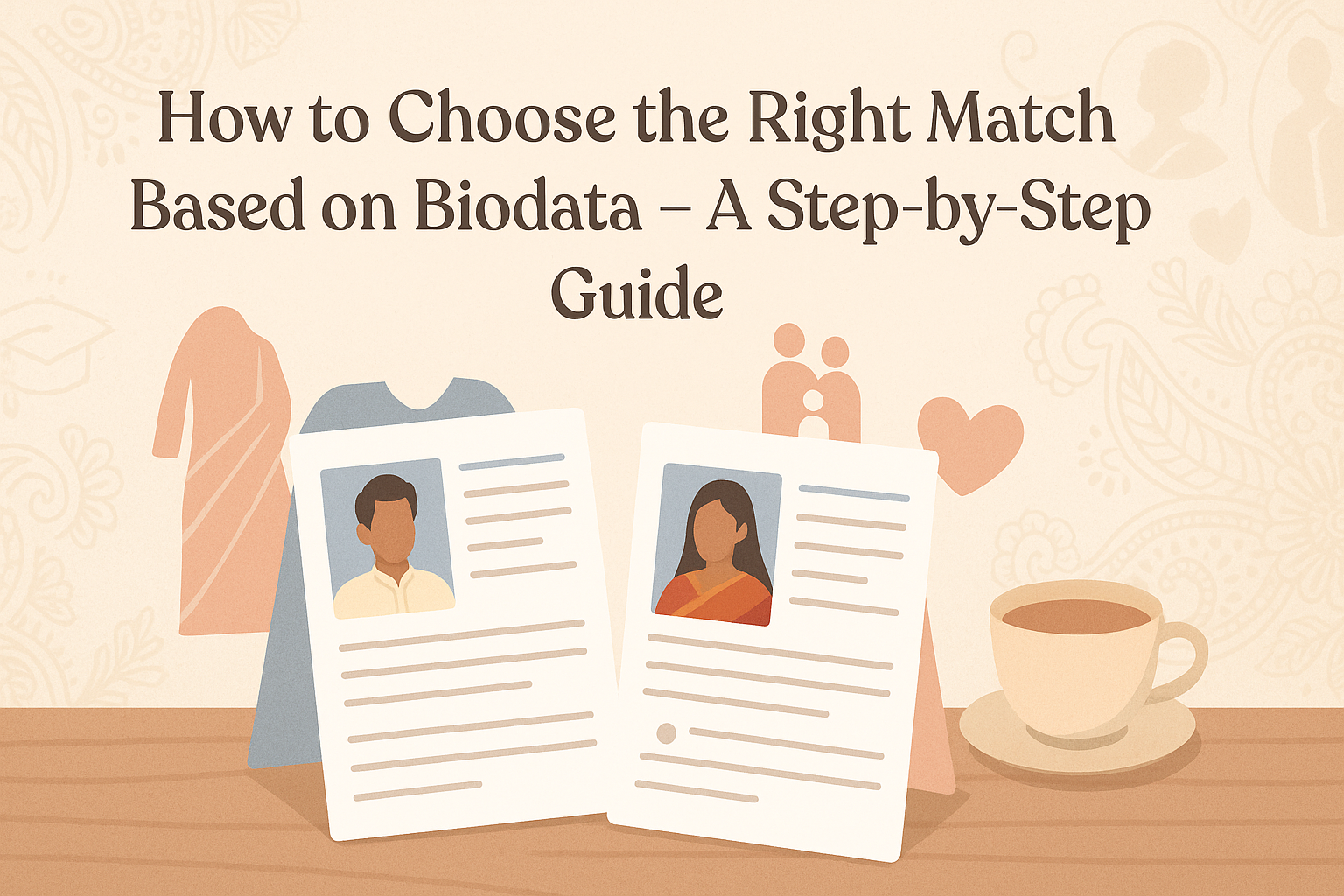
How to Choose the Right Match Based on Biodata – A Step-by-Step Guide
In Bangladesh, whether you call it "biye korbo" or
"life partnership goals," finding the right match often begins with
one key document: the biodata. Yes, that humble piece of paper has the power to
make or break a lifetime of dreams. But how do you decode it properly without
getting lost in degrees, blood groups, or height measurements?
Don't worry — we’ve got you covered! Let’s break it down in
a way that’s respectful, realistic, and maybe even a little fun.
Step 1: First Impressions Matter – But Don’t Be Swayed by Looks Alone
It’s easy to get dazzled by a stunning photo or a charming
smile. While physical attraction does matter, don’t let it be the dealbreaker.
Think of the photo as the cover of a book — it draws you in, but what’s inside
really counts.
Step 2: Check the Basics – Age, Education, and Profession
The first things you’ll notice on any biodata are usually:
- Age
- Education
- Occupation
Make sure these align with your preferences or family
expectations. But remember, flexibility here can lead to better compatibility
than rigidity.
Example: Maybe someone didn’t attend BUET but is
successful and emotionally intelligent — isn’t that worth a second look?
Step 3: Look Beyond the Labels – Understand Personality Clues
Does the biodata mention hobbies, likes/dislikes, or values?
Someone who writes “loves Rabindra Sangeet and weekend cooking” already gives
you a sneak peek into their lifestyle.
Ask yourself:
- Can
I imagine sharing my free time with this person?
- Do
our values match?
Step 4: Family Matters – But Not Just the Number of Siblings
In Bangladeshi culture, family background often plays a big
role. It’s not about wealth or status alone but understanding:
- Family
values
- Relationship
with parents
- Cultural
and religious alignment
A strong, supportive family environment can be a good
indicator of emotional maturity.
Step 5: Religion and Values – A Sensitive but Essential Topic
Whether you’re conservative, liberal, or somewhere in
between, shared values often contribute to harmony. If the biodata touches on
religious practices or beliefs, take note. Respect your own boundaries and
theirs.
Remember: Compatibility is more than just praying at the
same time — it’s about mutual respect.
Step 6: Take the Conversation Forward – The First Phone Call or Meeting
Now comes the exciting part: interaction. Don’t go in like
you’re conducting an interview. Be curious, be kind.
Great conversation starters:
- “I
noticed you love painting — how did that start?”
- “Your
profile mentioned you’re into tech startups. Tell me more!”
You’ll learn more in one natural conversation than hours of
analysis.
Step 7: Social Media Sleuthing – With Caution!
Yes, we all do it. A quick Facebook or Instagram search can
reveal a lot — but don’t jump to conclusions based on one meme or filtered
selfie.
Use it to understand lifestyle alignment, not to judge
character.
Step 8: Red Flags to Watch Out For
Every biodata tells a story — sometimes even what’s not
said is important:
- Too
vague? Ask why.
- Too
perfect? Dig a little.
- Conflicting
info? Clarify.
Don’t ignore your gut. If something feels off, take your
time to reassess.
Step 9: Involve Trusted People – But Keep It Balanced
Parents, cousins, that one wise chacha — they all want to
help. Get input, but don’t let them make the final call for you.
It’s your life partner, after all.
Step 10: Match Vibes, Not Just Metrics
Height, salary, GPA — these are data points. But marriage
isn’t a spreadsheet. Focus on emotional connection, communication, and the
ability to grow together.
Bonus: What If It Doesn’t Work Out?
Hey, not every biodata will lead to your "golper
nayok/nayika." That’s okay. Dating or matchmaking isn’t failure-proof —
it’s a journey.
Be kind. Be honest. Move on respectfully.
Final Thoughts: Love, Logic, and a Little Leap of Faith
Choosing the right match based on biodata is part logic,
part instinct, and a big part communication. It’s like choosing the right mango
from a huge pile — a little firm, a little sweet, and just right for you.
Trust the process. Ask the right questions. And remember —
love always deserves a thoughtful beginning.
FAQs
1. Is it okay to reject someone just based on a biodata?
Yes, if you feel it’s not the right fit. But always be respectful in your
decision.
2. Should I meet in person before saying yes?
Absolutely. One meeting can often say more than pages of biodata.
3. How important is horoscope matching in Bangladeshi
biodatas?
It depends on personal and family beliefs. Respect it if it’s important to
either party.
4. What if I like someone but my family doesn’t approve?
Open, honest communication is key. Try to find middle ground and involve a
mediator if needed.
5. Can I add humor or creativity to my own biodata?
Definitely! A touch of personality can make you stand out — just keep it
tasteful.